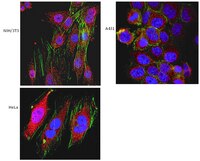MABC83 Sigma-AldrichAnti-Vps4/SKD1 Antibody, clone 5E6.1
Anti-Vps4/SKD1 Antibody, clone 5E6.1 is an antibody against Vsp4/SKD1 for use in Western Blotting, ICC.
More>> Anti-Vps4/SKD1 Antibody, clone 5E6.1 is an antibody against Vsp4/SKD1 for use in Western Blotting, ICC. Less<<Productos recomendados
Descripción
| Replacement Information |
|---|
Tabla espec. clave
| Species Reactivity | Key Applications | Host | Format | Antibody Type |
|---|---|---|---|---|
| H, M | WB, ICC | M | Purified | Monoclonal Antibody |
| References |
|---|
| Product Information | |
|---|---|
| Format | Purified |
| Control |
|
| Presentation | Purified mouse monoclonal IgG1κ in buffer containing 0.1 M Tris-Glycine (pH 7.4), 150 mM NaCl with 0.05% sodium azide. |
| Quality Level | MQ100 |
| Physicochemical Information |
|---|
| Dimensions |
|---|
| Materials Information |
|---|
| Toxicological Information |
|---|
| Safety Information according to GHS |
|---|
| Safety Information |
|---|
| Storage and Shipping Information | |
|---|---|
| Storage Conditions | Stable for 1 year at 2-8°C from date of receipt. |
| Packaging Information | |
|---|---|
| Material Size | 100 µg |
| Transport Information |
|---|
| Supplemental Information |
|---|
| Specifications |
|---|
| Global Trade Item Number | |
|---|---|
| Número de referencia | GTIN |
| MABC83 | 04053252594946 |
Documentation
Anti-Vps4/SKD1 Antibody, clone 5E6.1 Ficha datos de seguridad (MSDS)
| Título |
|---|
Anti-Vps4/SKD1 Antibody, clone 5E6.1 Certificados de análisis
| Cargo | Número de lote |
|---|---|
| Anti-Vsp4/SKD1, clone 5E6.1 | 2479931 |
| Anti-Vsp4/SKD1, clone 5E6.1 - 2388327 | 2388327 |
| Anti-Vsp4/SKD1, clone 5E6.1 - 2342887 | 2342887 |
| Anti-Vsp4/SKD1, clone 5E6.1 - 3156014 | 3156014 |
| Anti-Vsp4/SKD1, clone 5E6.1 - 3673833 | 3673833 |
| Anti-Vsp4/SKD1, clone 5E6.1 - 3982030 | 3982030 |
| Anti-Vsp4/SKD1, clone 5E6.1 - Q1985263 | Q1985263 |
| Anti-Vsp4/SKD1, clone 5E6.1 -2812307 | 2812307 |









-(+)-Carvone[818410_(S)-(+)-Carvone-ALL].jpg)








